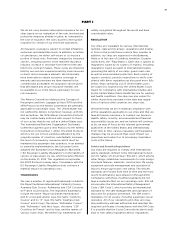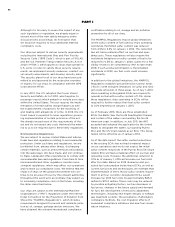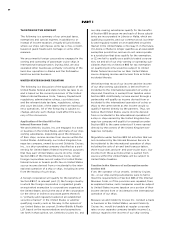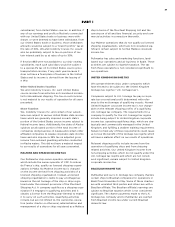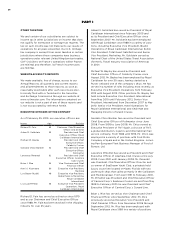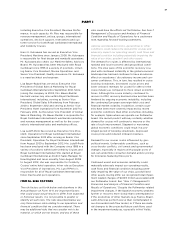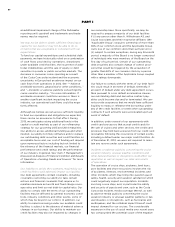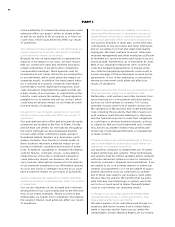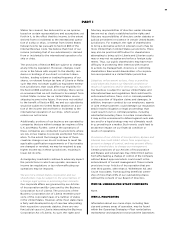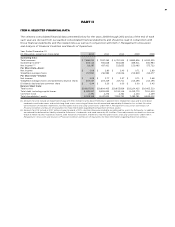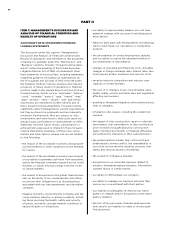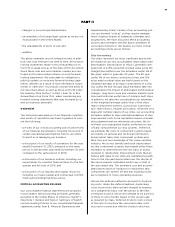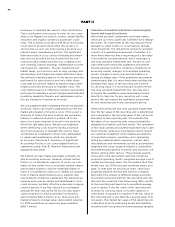Royal Caribbean Cruise Lines 2012 Annual Report Download - page 35
Download and view the complete annual report
Please find page 35 of the 2012 Royal Caribbean Cruise Lines annual report below. You can navigate through the pages in the report by either clicking on the pages listed below, or by using the keyword search tool below to find specific information within the annual report.
31
PART I
levels of investment. There can be no assurance that
these markets will develop as anticipated or that we
will have success in these markets, and if we do not,
we may be unable to recover our investment, which
could adversely impact our business, financial condi-
tion and results of operations.
Ship construction, repair or revitalization delays or
mechanical faults may result in cancellation of cruises or
unscheduled drydocks and repairs and thus adversely
affect our results of operations.
We depend on shipyards to construct, repair and revi-
talize our cruise ships on a timely basis and in good
working order. The sophisticated nature of building a
ship involves risks. Delays or mechanical faults in ship
construction or revitalization have in the past and may
in the future result in delays or cancellation of cruises
or necessitate unscheduled drydocks and repairs of
ships. These events and any related adverse publicity
could result in lost revenue, increased operating
expenses, or both, and thus adversely affect our
results of operations.
Shipyards and their subcontractors may experience
financial difficulties which could cause or result in delay,
ship cancellations, our inability to procure new capacity
in a timely fashion or increases in shipbuilding costs
that could adversely affect our results of operations.
We rely on shipyards to construct, repair and revital-
ize our vessels. Financial difficulties, liquidations or
closures suffered by these shipyards and/or their sub-
contractors may impact the timely delivery or costs
of new ships or the ability of shipyards to repair and
revitalize our fleet in accordance with our needs or
expectations. The shipyard that is building the two
newbuilds for our TUI Cruises joint venture is currently
experiencing financial difficulties. We have engaged
in discussions with the shipyard to assess the impact
on the ships they are building for TUI Cruises. This
situation could have a material impact on the ability
of the shipyard to deliver these ships in accordance
with the terms of the contract, the costs borne by
TUI Cruises associated with these ships and/or the
financial support that we may need to provide (e.g.
parent guarantees, additional equity contributions) to
seek to ensure timely completion.
In addition, there are a limited number of shipyards
with the capability and capacity to build our new
vessels and, accordingly, closures or consolidation in
the cruise shipyard industry could impact our ability
to construct new vessels when and as planned and/or
could result in stronger bargaining power on the part
of the shipyards and thus higher prices for our future
ship orders. Delivery delays and cancelled deliveries
can adversely affect our results of operations, as can
any constraints on our ability to build, repair and
maintain our ships on a timely basis.
Our operating costs, especially fuel expenditures,
could increase due to market forces and economic
or geo-political factors beyond our control.
Expenditures for fuel represent a significant cost of
operating our business. If fuel prices rise significantly
in a short period of time, we may be unable to increase
fares or other fees sufficiently to offset fully our
increased fuel costs. We routinely hedge a portion
of our future fuel requirements to protect against
rising fuel costs. However, there can be no assurance
that our hedge contracts will provide a sufficient
level of protection against increased fuel costs or that
our counterparties will be able to perform under our
hedge contracts, such as in the case of a counterparty’s
bankruptcy. Further volatility in fuel prices or disrup-
tions in fuel supplies could have a material adverse
effect on our results of operations, financial condition
and liquidity.
Our other operating costs, including food, payroll,
airfare, taxes, insurance and security costs are all sub-
ject to increases due to market forces and economic
or political conditions or other factors beyond our
control. Increases in these operating costs could
adversely affect our profitability.
Unavailability of ports of call may adversely affect our
results of operations.
We believe that port destinations are a major reason
why guests choose to go on a particular cruise or on
a cruise vacation. The availability of ports is affected
by a number of factors, including existing capacity
constraints, constraints related to the size of certain
ships, security concerns, adverse weather conditions
and natural disasters, financial limitations on port
development, exclusivity arrangements that ports
may have with our competitors, local governmental
regulations and local community concerns about
port development and other adverse impacts on
their communities from additional tourists. Any limita-
tions on the availability of our ports of call or on the
availability of shore excursion and other service pro-
viders at such ports could adversely affect our results
of operations.
Price increases for commercial airline service for our
guests or major changes or reduction in commercial
airline service and/or availability could adversely
impact the demand for cruises and undermine our
ability to provide reasonably priced vacation packages
to our guests.
Many of our guests depend on scheduled commercial
airline services to transport them to or from the ports
where our cruises embark or disembark. Increases in
the price of airfare would increase the overall price of
the cruise vacation to our guests which may adversely
impact demand for our cruises. In addition, changes


